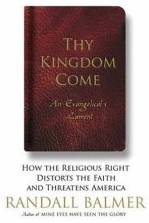 Scot McKnight has done a series reviewing the new book by Randall Balmer, Thy Kingdom Come, An Evangelical's Lament: How the Religious Right Distorts the Faith and Threatens America. Between this book and the book I'm reviewing here at my blog (Greg Boyd's The Myth of a Christian Nation, see my posts below), we have two new polemics against the Religious Right from those inside the evangelical camp.
Scot McKnight has done a series reviewing the new book by Randall Balmer, Thy Kingdom Come, An Evangelical's Lament: How the Religious Right Distorts the Faith and Threatens America. Between this book and the book I'm reviewing here at my blog (Greg Boyd's The Myth of a Christian Nation, see my posts below), we have two new polemics against the Religious Right from those inside the evangelical camp.Scot McKnight's posts have been excellent, and the comments have been incredible. Lots of interaction there; well worth the read.
Here's a summary with links to Scot McKnight's blog:
Chapter 1 is about abortion, homosexuality, and the ruse of selective literalism.
McKnight says, "What I’ve seen in this book makes me think the conservative evangelical will be offended, the emerging Christian who leans left will love the book, but the most important group that needs to read this book may not read it: the Democratic Party."
Chapter 2 asks the question, “Where have all the Baptists Gone?” and looks at the First Amendment.
Here’s the overall thesis of the chapter: “America needs more Baptists — real Baptists, not counterfeit Baptists like Roy Moore or Rick Scarborough or Richard Land or Jerry Falwell, all whom are Baptists in name only”...
McKnight writes, "Here’s a major point he is making, and I’m not sure there is enough discussion of this point. Is it true or is it not? 'We must recognize that religion flourishes best at the margins and not at the centers of power.'"
Chapter 3 is on education.
Balmer writes, “Whatever common culture we have attained in this country has come about largely though the agency of public education. At the risk of sounding mawkish, I truly believe that public schools served to make America what it is by helping us forge a mutual understanding of one another as Americans...Homeschooling, school vouchers, and charter schools all diminish the possibilities for such understanding”
Chapter 4 asks the questions, "Evolution or intelligent design, science or faith?"
According to Balmer, Intelligent Design “is religion, not science, and the proper venue for the propagation of faith is the home or the church, not the university...As a believer, I have no problem accepting that God, in some way that I cannot fully explain, is responsible for the created order, but that is an assertion of faith, not a conclusion vindicated by scientific inquiry, for I know of no experiment to test empirically for the presence of God.”
Chapter 5 is about environmentalism.
Balmer writes,
“Care for the earth, God’s creation, should be an instinctive response on the part of those who number themselves among the followers of Jesus — and even more so for those who insist that an intelligent designer fahsioned the natural world. The Religious Right, however, conjuring the goblins of neopaganism, have cast their lot with corporate and business interests, distorting the faith with a narrow, pinched reading of Genesis. This theology of dominion, coupled with the wise use ideology of corporate interests, places humanity in the role of exploiter and justifies the plundering of natural resources.”
Chapter 6, according to McKnight, "is both a jeremiad and a plea — a critique of the Religious Right and a basket of suggestions of how evangelicals can move forward."
Balmer asks, what would America look like if the RR had its way? They would “take the country back to the seventeenth century” and “impose their vision of a moral order on all of society” (181). In other words, Balmer sees the RR to be the 21st Century’s embodiment of American Puritanism. Both groups are frightened by pluralism.
technorati: politics, emerging church

2 comments:
Thanks for this summary. I haven't been able to read all of the JesusCreed discussion this week so I appreciate the one page teaser. Good for you for reading and reflecting on the Greg Boyd book as well.
Andy Rowell
Taylor University
Department of Biblical Studies and Christian Ministry
Blog: Church Leadership Conversations
I like McKnight's characterization of Balmer's work. I haven't read it, but I did meet the man at Ron Sider's conference over a year ago. My general impression was that he understands incredibly well, through his comprehensive 20th Ctry historical studies, what is wrong with the religious right, but that his suggestions of how evangelicals may move forward need to be couched somewhat less stridently, acknowledging his own fallibilism.
dlw
Post a Comment